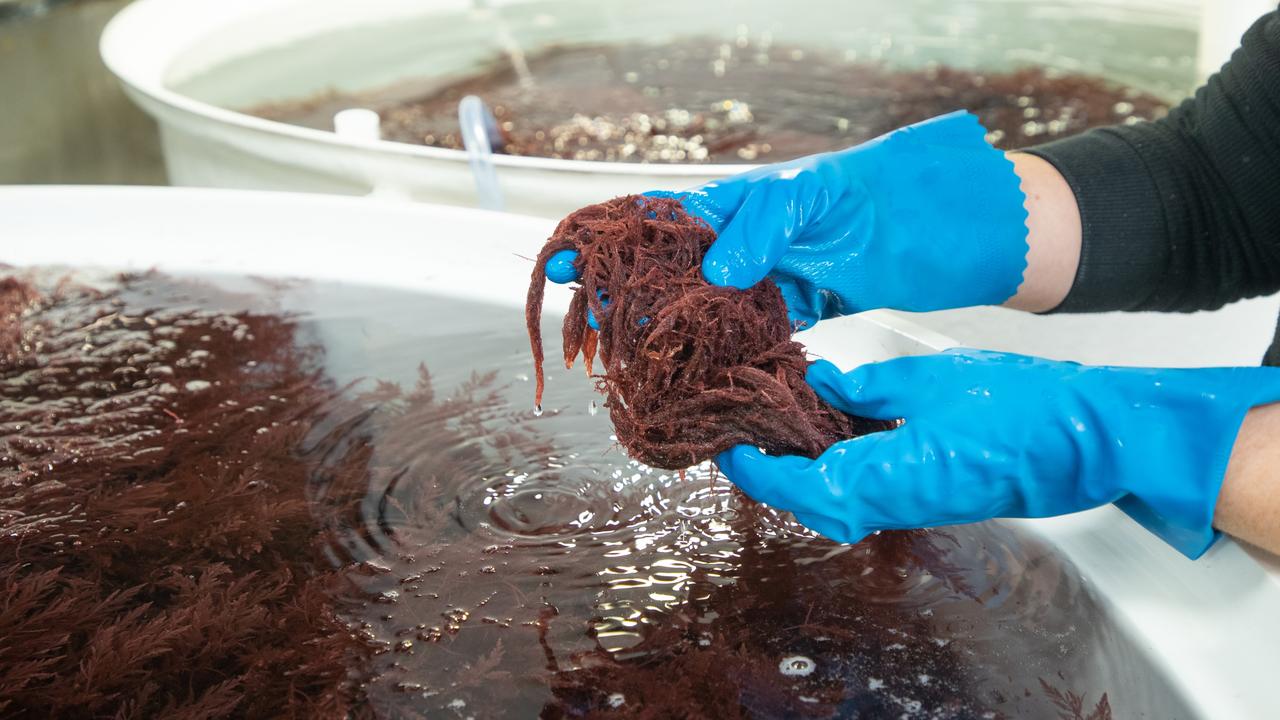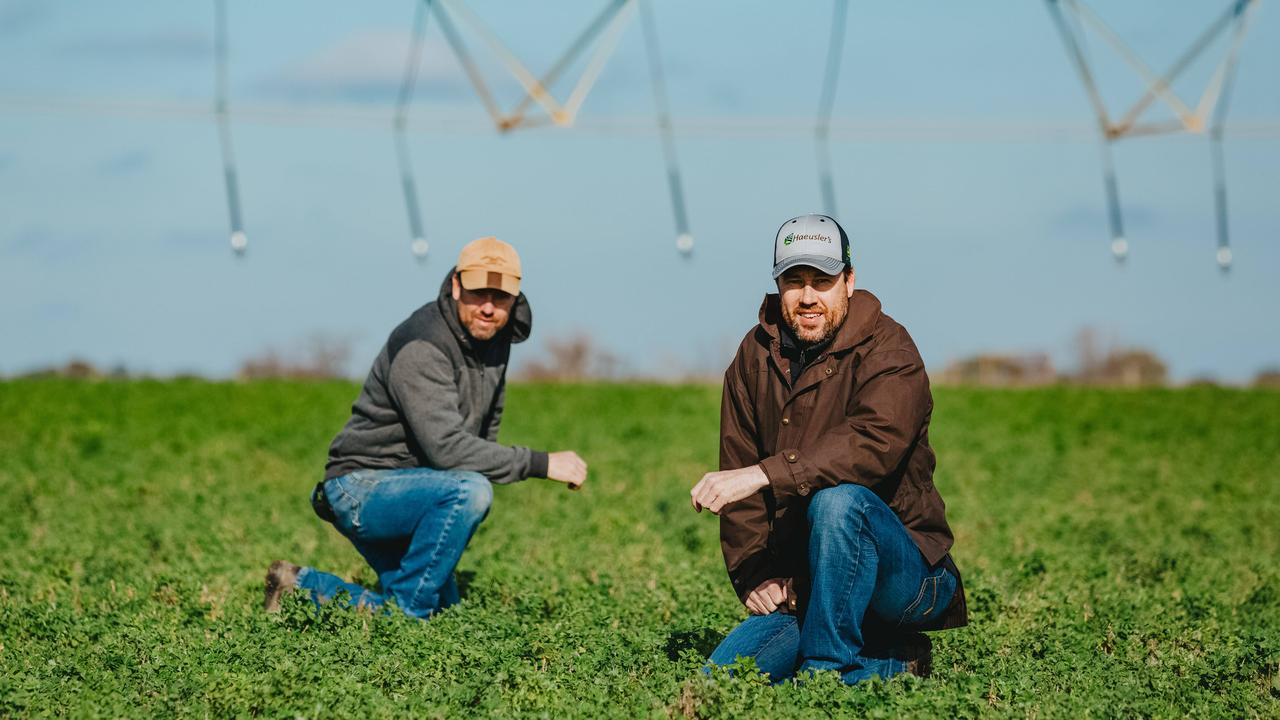Paddock to pint for Mitta Mitta Brewing Company
Two couples have teamed up to launch a brewery and take the art of craft brewing to the next level by growing their own hops.
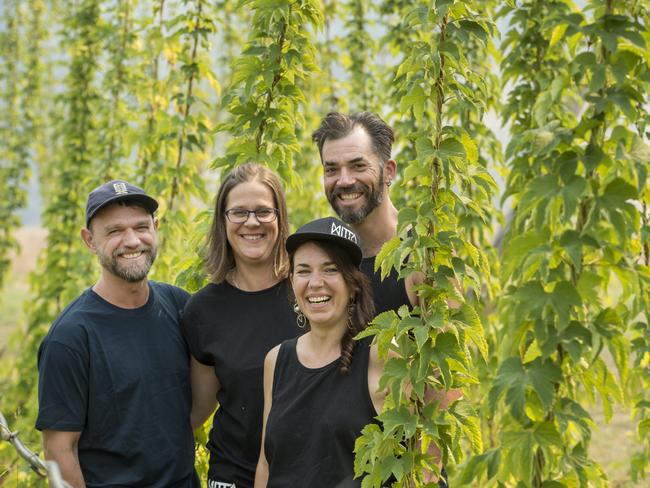
- Farm magazine
is available with The Weekly Times out March 4 or for subscribers as part of our digital edition
- Why it pays to subscribe to The Weekly Times+
FULL disclosure: Tim Cabelka, from Mitta Mitta Brewing Company, became a brewer because he enjoys the odd quaff or three.
“That’s probably what starts most people in the beer industry,” the 42-year-old says.
What Tim didn’t necessarily bargain on when he first started brewing beer at home at the age of 22, was that his hobby would eventually see him build a brewery and also become a hops farmer.
In 2011 Tim and his wife, Jen, and their best mates (and fellow beer aficionados) Alec Pennington and partner Chris Rowe decided to go into business together to build a brewery on a 16-hectare property – inherited by Alec – at Mitta Mitta, in Victoria’s North East.
In the winter of 2012 they planted three varieties of hops on a 1000sq m plot, now yielding up to 90kg of dry hops annually, which Tim and Alec oversee.
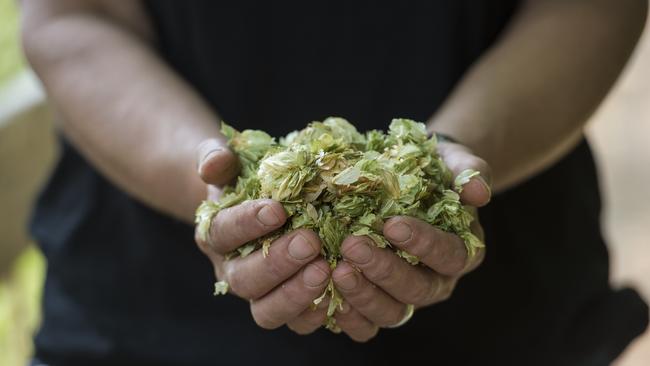
On another section of the property they built a restaurant, opened in 2018, where food-loving Alec and Chris can seat 30 patrons inside and up to 50 outside.
With the help of five staff, they serve a menu that showcases local produce, in addition to the restaurant’s bar, where beer is served on tap.
Alongside the restaurant the foursome built a 150-litre brewery in a corrugated shed, where Tim transforms those 90kg of dry hops into an average annual 30,000 litres of beer a year, in three varieties, as well as seasonal beers. About 60 per cent is sold in the neighbouring tap room, with the rest sold to retailers in the Albury-Wodonga region.
Such is the success of the enterprise, the families (who have a total of five children between them) are now planning an expansion this year: nearly half a hectare of hops, which will total up to 400kg of dry product, as well as a new brewery capable of producing 800 litres per brew.
So when most beer is made by large – or craft – brewers who buy in hops, why did Mitta Mitta Brewing Company decide to grow from paddock to pint?
“It’s harder growing it yourself and it is tempting to source hops from other growers, but I like the idea of low food miles and keeping it local,” Tim says.
“We even source our malt from the southern NSW Riverina and our yeast from Melbourne. We all like the idea of sustainability, burning less diesel. Even in the kitchen, where possible we source and support local.
“We have the space to grow it here and there’s big demand for hops so if we did outsource it we may not always be able to get the varieties we want. This way we’re more self-reliant.”
While Tim grew up in Melbourne, his varied career in many ways led to this.
After school he studied aerospace engineering, worked at Moorabbin Airport, became a welder, worked in a bar, and then was an industrial abseiler.
Having brewed beer since his early adulthood, when he saw an ad in 2004 for a brewer at Red Hill Brewery on the Mornington Peninsula he thought he’d struck gold when he applied and was accepted, later completing a brewing course at Federation University.
Part of his role at Red Hill was also hop growing. It is one of the only other craft brewers to grow the crop.
“It was a quick learning curve, but I’m a bit of a quick learner,” he says. “I had the basic background after full grain brewing at home, so I just built on that.”
So when Alec and Chris approached him with the concept of branching into their own brewery, it was a no-brainer.
The two couples combined their finances, with help from their families, and set about building the business, needing to source an extra $30,000 from crowdfunding in 2017 to finish the project.
Tim sourced three varieties of rhizomes from a grower in Canberra, each with a different flavour and bitterness profile, and each with a staggered harvest. Saaz, for instance, has a spicy aroma and harvests last in February-March, whereas Mt Hood has a citrus undertone and harvests first in early to mid-February.
With his welding background, Tim – with Alec – built a trellis-system, nine rows, 2m apart and then spaced plants 1m apart. Strings encourage bines to grow up to 5m high.
Rhizomes multiply and need separation, either sold to gardeners or set aside to be used in Mitta Mitta Brewing Company’s expanded growing plot, although Tim has also sourced three different varieties from Tasmania to grow on the new site.
Tim says Mitta Mitta is an ideal area to grow hops: the correct latitude, with the right amount of sun, heat, cold, loamy-clay soil and rain. While the Mitta Valley is a high-rainfall area, the hops are thirsty and are drip irrigated.
Tim farms with an organic philosophy, although is not certified and says he would use a chemical input if absolutely necessary.
To the soil he adds sulphate of potash and homemade compost (manure from the property’s 15 beef cattle and 20 sheep, as well as food waste from the restaurant and bine cuttings).
This year an agronomist sampled soils and leaf tissue, recommending two trace minerals be added, including boron.
The bines have had no pest or disease problems, although Tim understands they can be vulnerable to red spotted spider mite and powdery and downy mildew, while rabbits can eat new shoots.
“We haven’t had any problems. Hops are relatively low maintenance – apart from the pruning, stringing, training and harvesting.”
Hop bines grow fast – more than 5m in a season, but they are cut down almost to ground level each harvest.
With his abseiling background, Tim is comfortable climbing a tower on the back of a ute to cut down bines, which are then taken to the restaurant where friends, family and local residents “drink, chat and pick” the fragrant soft pine cone flowers.
“It’s not hard work but it’s monotonous and time-consuming, so we get about 20 people who hand pluck the flowers while having a feed,” he says.
Hops are air dried up to two days, then compressed in vacuum-sealed bags and frozen for later use.
With his engineering background, Tim made his own medium-tech brewery using stainless-steel drums, adding in pumps and fermenters.
He sources malted barley largely from Voyager Craft Malt in the Riverina, brewing twice a day, up to seven hours each time, and about two times a week.
Tim says he has a Czech heritage and so prefers to make a European-style beer, like a pilsner or lager, as opposed to a “hoppy” American pale ale, given the hop varieties he grows.
He agrees while it is every beer drinker’s dream to run a brewery, he adds it is “bloody hard work”.
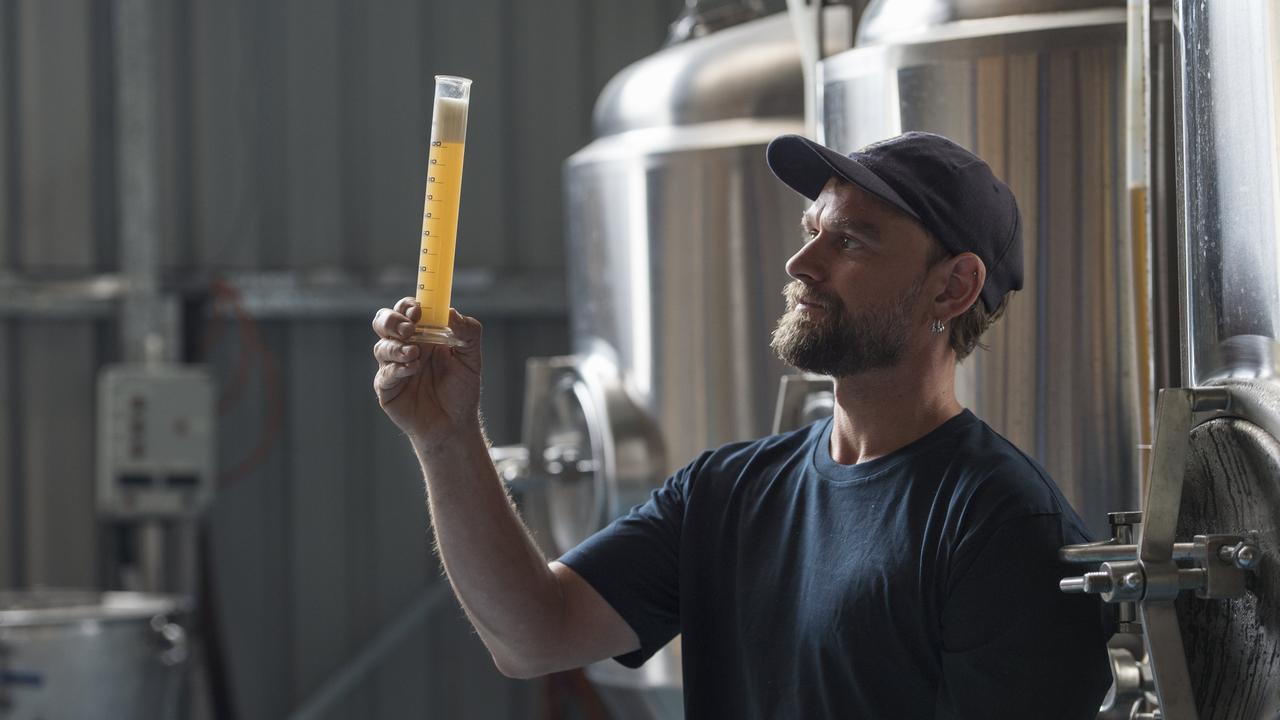
“We knew a business like this would do pretty well here and it’s nice to see it has. We have let it grow organically but for a long time the money was just going one way, now it’s starting to go the other way but we’ve sacrificed our salaries.
“There’s never enough time in the week to do all the work required but there’s a lot of happiness in the job. It’s particularly peaceful brewing at 5.30am, satisfying when all the elements come together, or sitting at the bar seeing other people enjoy what we’ve created.”
TALL ORDER
WHEN Red Hill Brewery opened its doors to the public in 2005, as far as owners Karen and David Golding could gauge, after planting hops bines in the late ’90s, they were the first to harvest them for their own beer.
“You can still only count on one hand the number who grow hops, have a brewery and sell beer,” Karen says.
“On the Mornington Peninsula it’s council law that there’s a direct agricultural link to use of land for a commercial operation. It’s the only way to start a brewery on rural land.”
Red Hill Brewery sits on two hectares, growing four varieties of hops – hallertauer, tettnanger, golding and willamette – producing 80,000 litres of beer in a steamfired brewhouse.
Other beer-makers dabbling in growing their own hops include Western Australia’s Rocky Ridge Brewing Co, St Andrews Beach Brewery on the Mornington Peninsula, and Seven Sheds Brewery in Tasmania. Karen says she understands why more haven’t followed their lead.
“It’s a big extra effort to be a farmer and brewer and run a restaurant,” she says. “Land is expensive and hops are a low-value crop – not like grapes where a winery can charge a lot for a bottle of wine.”
She says one of the joys of growing hops is inviting the public to volunteer their help to harvest.
“Having hops improves the visitor experience and makes us true artisan producers,” she says.
FARM FILE: Mitta Mitta Brewing
Tim and Jen Cabelka, Alec Pennington and Chris Rowe run Mitta Mitta Brewery and restaurant on 16 hectares in Victoria’s North East, where they grow three varieties of hops to supply their beers. They produce about 90kg of dry hops a year and 30,000 litres of beer, selling on tap and in 500ml bottles, in cases of 16 for $69-$77.
Where: Mitta Mitta, North East
More info: mittabrewing.com.au
OAK AND SWAN SOURDOUGH GOES BACK TO GRINDSTONE


